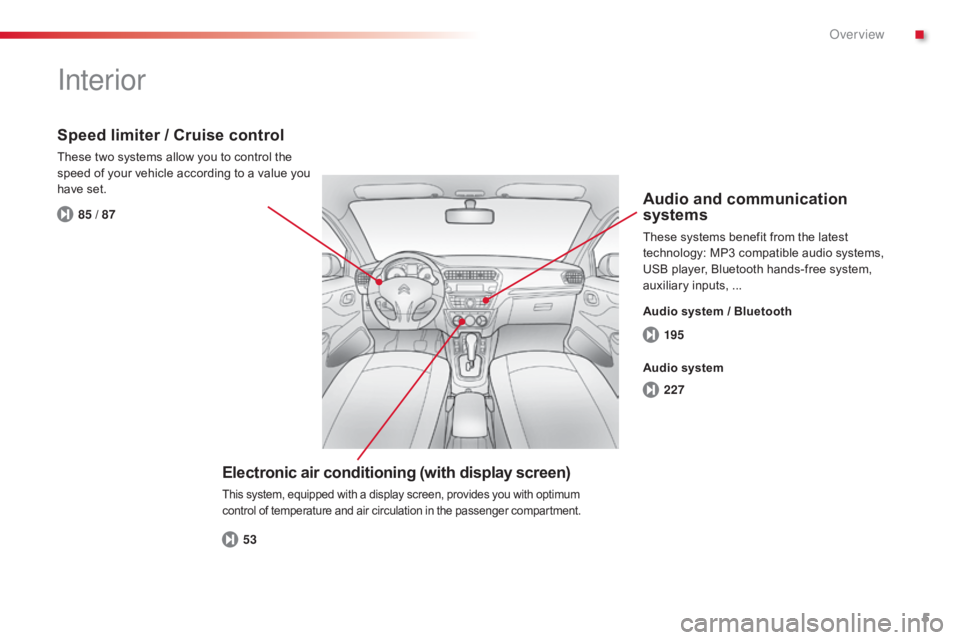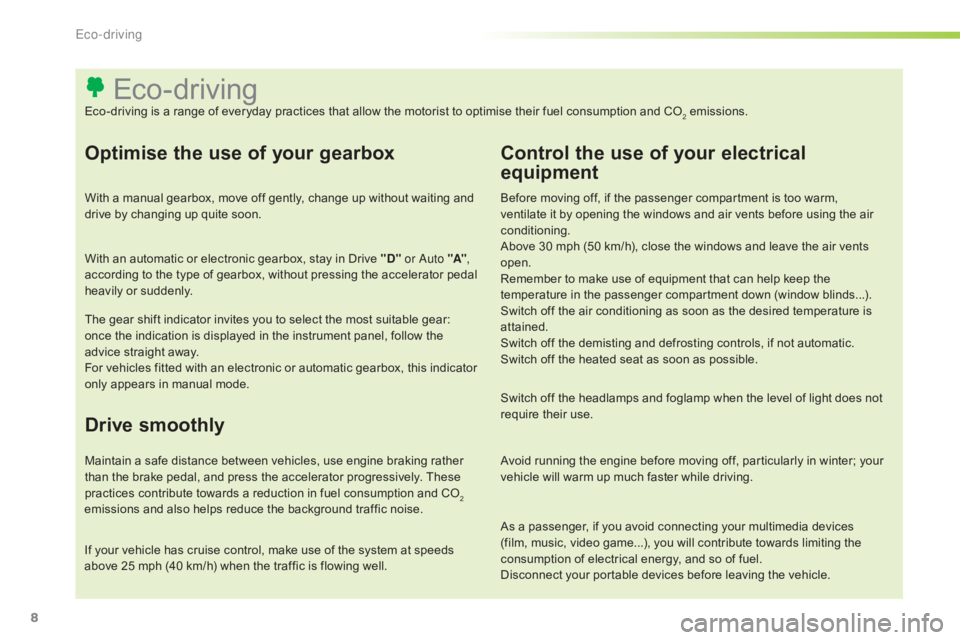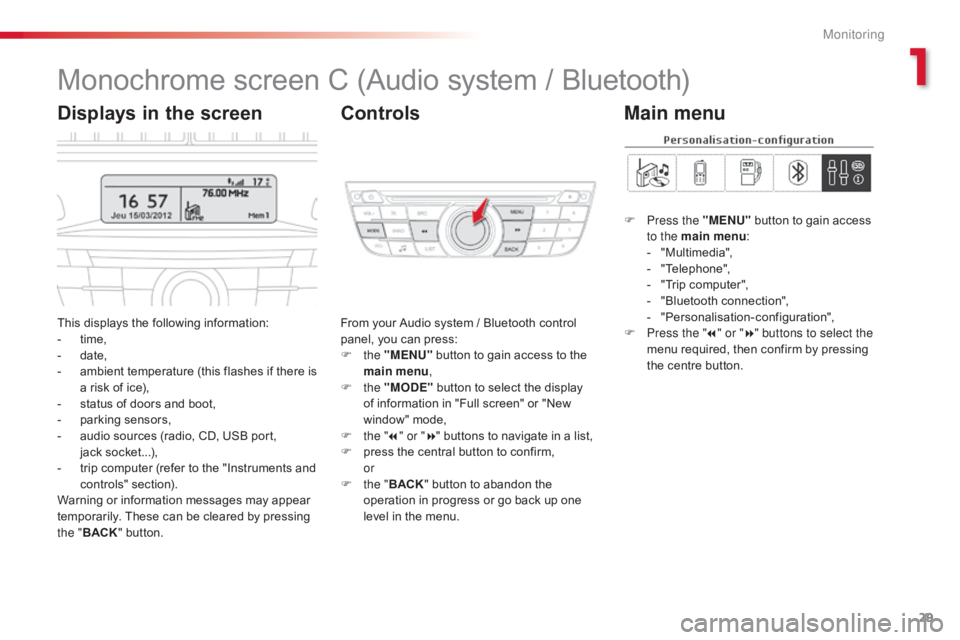temperature CITROEN C-ELYSÉE 2017 Owners Manual
[x] Cancel search | Manufacturer: CITROEN, Model Year: 2017, Model line: C-ELYSÉE, Model: CITROEN C-ELYSÉE 2017Pages: 260, PDF Size: 7.11 MB
Page 7 of 260

5
195
227
53
85 / 87
C-elysee_en_Chap00b_vue-ensemble_ed01-2016
Interior
Electronic air conditioning (with display screen)
This system, equipped with a display screen, provides you with optimum control of temperature and air circulation in the passenger compartment.
Speed limiter / Cruise control
These two systems allow you to control the speed of your vehicle according to a value you
h
ave set.
Audio and communication
systems
These systems benefit from the latest technology: MP3 compatible audio systems,
U
SB player, Bluetooth hands-free system,
a
uxiliary inputs, ...
Audio system / Bluetooth
Audio system
.
Over view
Page 10 of 260

8
As a passenger, if you avoid connecting your multimedia devices (film, music, video game...), you will contribute towards limiting the
c
onsumption of electrical energy, and so of fuel.
Disconnect
your portable devices before leaving the vehicle.
Eco-driving
Eco-driving is a range of everyday practices that allow the motorist to optimise their fuel consumption and CO2 emissions.
Optimise the use of your gearbox
With a manual gearbox, move off gently, change up without waiting and drive by changing up quite soon.
With
an automatic or electronic gearbox, stay in Drive "D" or Auto "A" ,
according
to the type of gearbox, without pressing the accelerator pedal
hea
vily
o
r
s
uddenly.
The
gear shift indicator invites you to select the most suitable gear:
o
nce the indication is displayed in the instrument panel, follow the
a
dvice straight away.
For
vehicles fitted with an electronic or automatic gearbox, this indicator
o
nly appears in manual mode.
Drive smoothly
Maintain a safe distance between vehicles, use engine braking rather than the brake pedal, and press the accelerator progressively. These
p
ractices contribute towards a reduction in fuel consumption and CO
2
emissions
and
also
helps
reduce
the
background
traffic
noise.
If
your
vehicle
has
cruise
control,
make
use
of
the
system
at
speeds
a
bove
25
mph
(40
km/h)
when
the
traffic
is
flowing
well.
Control the use of your electrical
equipment
Before moving off, if the passenger compartment is too warm, v entilate it by opening the windows and air vents before using the air
c
onditioning.
Above
30 mph (50 km/h), close the windows and leave the air vents
ope
n.
Remember
to make use of equipment that can help keep the
t
emperature in the passenger compartment down (window blinds...).
Switch
off the air conditioning as soon as the desired temperature is
a
ttained.
Switch
off the demisting and defrosting controls, if not automatic.
Switch
off the heated seat as soon as possible.
Switch
off the headlamps and foglamp when the level of light does not
r
equire their use.
Avoid
running the engine before moving off, particularly in winter; your
v
ehicle will warm up much faster while driving.
Eco-driving
Page 15 of 260

13
C-elysee_en_Chap01_controle-de-marche_ed01-2016
C-elysee_en_Chap01_controle-de-marche_ed01-2016
Warning / indicator lampStateCause Action / Observations
Diesel engine
pre-heating fixed.
The
key is at position 2 (ignition on) in
t
he ignition switch.Wait
until the warning lamp goes off before starting.
The
period of illumination of the warning lamp is
d
etermined by the ambient conditions (up to about
t
hirty seconds in very low temperatures).
If
the engine does not start, switch the ignition off and
t
hen on, wait until the warning lamp goes off again,
t
hen start the engine.
Parking
brake fixed.
The
parking brake is applied or not
p
roperly
r
eleased.Release
the parking brake to switch off the warning
l
amp, keeping your foot on the brake pedal.
Observe
the safety recommendations.
For
further information on the parking brake, refer to
t
he "Driving" section.
Foot on the
brake pedal fixed.
The
brake pedal must be pressed. With an electronic gearbox, press the brake pedal to
s
tart the engine (lever in position N).
W
ith an automatic gearbox, with the engine running,
p
ress the brake pedal before releasing the parking
b
rake, to unlock the lever and come out of position P.
If
you wish to release the parking brake without
p
ressing the brake pedal, this warning lamp will
r
emain on.
flashing. With
an electronic gearbox, if you
h
old the vehicle on an incline using
t
he accelerator for too long, the
c
lutch overheats.Use
the brake pedal and/or the parking brake.
1
Monitoring
Page 19 of 260

17
C-elysee_en_Chap01_controle-de-marche_ed01-2016
C-elysee_en_Chap01_controle-de-marche_ed01-2016
Warning / indicator lampStateCause Action / Observations
Braking fixed. The
brake fluid level has dropped
s
ignificantly.You
must stop as soon as it is safe to do so.
Top
up with brake fluid listed by CITROËN.
If
the problem persists, have the system checked by a
C
ITROËN dealer or a qualified workshop.
+ fixed,
associated
w
ith the ABS warning
lam
p.The
e
lectronic
b
rake
f
orce
d
istribution
(
EBFD) system has a fault.You
must stop as soon as it is safe to do so.
Have
it checked by a CITROËN dealer or a qualified
w
orkshop.
Maximum
coolant
temperature fixed
red.The
temperature of the cooling
s
ystem is too high.Stop
as soon as it is safe to do so.
Wait
until the engine has cooled down before topping
u
p the level, if necessary.
If
the problem persists, contact a CITROËN dealer or
q
ualified
w
orkshop.
Under-inflation fixed,
accompanied by
a
n audible signal and
a
message.The
pressure in one or more tyres is
t
oo low.Check
the tyre pressures as soon as possible.
This
check should preferably be carried out when the
t
yres are cold.
You
must reinitialise the system after the adjustment
o
f one or more tyre pressures and after changing one
o
r more wheels.
For
more information on under-inflation detection,
r
efer to the corresponding section.
+ flashing
then fixed,
a
ccompanied by the
S
ervice warning lamp.The
system has fault: the tyre
p
ressures are no longer monitored.Check
the tyre pressures as soon as possible.
Have
the system checked by a CITROËN dealer or a
q
ualified
w
orkshop.
1
Monitoring
Page 31 of 260

29
C-elysee_en_Chap01_controle-de-marche_ed01-2016
C-elysee_en_Chap01_controle-de-marche_ed01-2016
Monochrome screen C (Audio system / Bluetooth)
This displays the following information:
- t ime,
-
d
ate,
-
a
mbient temperature (this flashes if there is
a
risk of ice),
-
s
tatus of doors and boot,
-
p
arking sensors,
-
a
udio sources (radio, CD, USB port,
j
ack socket...),
-
t
rip computer (refer to the "Instruments and
c
ontrols"
s
ection).
Warning
or information messages may appear
t
emporarily. These can be cleared by pressing
t
he " BACK "
button. From
your Audio system / Bluetooth control p
anel, you can press:
F
the "MENU"
button to gain access to the
m
ain menu,
F
the "MODE"
button to select the display
o
f information in "Full screen" or "New
w
indow" mode,
F
t
he "7" or " 8"
buttons to navigate in a list,
F
p
ress the central button to confirm,
or
F
t
he "BACK "
button to abandon the
o
peration in progress or go back up one
l
evel in the menu.
Displays in the screenControls
F Press the "MENU" button to gain access t
o the main menu :
-
"
Multimedia",
-
"
Telephone",
-
"
Trip computer",
-
"
Bluetooth connection",
-
"
Personalisation-configuration",
F
P
ress the " 7" or " 8" buttons to select the
menu
required, then confirm by pressing
t
he centre button.
Main menu
1
Monitoring
Page 46 of 260

44
C-elysee_en_Chap03_confort_ed01-2016
F To raise the head restraint, pull it upwards.
F T o remove the head restraint, press the lug A
and
pull the head restraint upwards.
F
T
o put the head restraint back in place,
e
ngage the head restraint stems in the
o
penings keeping them in line with the seat
b
ack.
F
T
o lower the head restraint, press the lug A
and
the head restraint at the same time.The
head restraint is fitted with a frame
w
ith notches which prevents it from
l
owering; this is a safety device in case
o
f impact.
The adjustment is correct when the
upper edge of the head restraint is
level with the top of the head.
Never
drive with the head restraints
r
emoved; they must be in place and
adj
usted
c
orrectly.
Adjusting the height of
the
h
ead restraint
Press the control.
T he temperature is controlled automatically.
Pressing
a second time stops operation.
Heated seat control
Comfort
Page 52 of 260

50
C-elysee_en_Chap03_confort_ed01-2016
In order for these systems to be fully effective, follow the operation and maintenance guidelines belo w:
F
T
o obtain an even air distribution, take care not to obstruct the exterior air intake grilles
l
ocated at the base of the windscreen, the nozzles, the vents and the air outlets, as well
a
s the air extractor located in the boot.
F
O
perate the air conditioning system for at least 5 to 10 minutes, once or twice a month
t
o keep it in per fect working order.
F
E
nsure that the passenger compartment filter is in good condition and have the filter
e
lements replaced regularly.
F
T
o ensure correct operation of the air conditioning system, you are also advised to have
i
t checked regularly as recommended in the maintenance and warranty guide.
F
I
f the system does not produce cold air, switch it off and contact a CITROËN dealer or a
q
ualified
w
orkshop.
When
towing the maximum load on a steep gradient in high temperatures, switching off the
a
ir conditioning increases the available engine power and so improves the towing ability.
Recommendations for ventilation and air conditioning
If after an extended stop in sunshine, the i nterior t emperature i s v ery h igh, f irst
v
entilate the passenger compartment for
a
few moments.
Put
the air flow control at a setting high
e
nough to quickly change the air in the
p
assenger
c
ompartment.
The
air conditioning system does not
c
ontain chlorine and does not present
a
ny danger to the ozone layer.
The
condensation created by the air
c
onditioning results in a discharge
o
f water under the vehicle which is
p
er fectly normal.
C
Page 53 of 260

51
C-elysee_en_Chap03_confort_ed01-2016
1. Temperature level adjustment
F Turn the control knob from b
lue (cold) to red (hot) to
a
djust the temperature to your
r
equirements. This
system only operates with the engine running.
2. Air flow adjustment
F Turn
the control knob from p
osition 1 to position 4 to obtain
a
comfortable air flow. If you put the air flow control in
position 0
(system off), the temperature
i
s no longer controlled. However,
a
slight flow of air can still be felt,
r
esulting from the movement of
t
he vehicle.
Manual air conditioning
( without display screen)
Heating
/
Ventilation
This system only operates when the engine is running.
3
Comfort
Page 54 of 260

52
C-elysee_en_Chap03_confort_ed01-2016
3. Air distribution adjustment
Windscreen and side windows.
W indscreen, side windows and
f
ootwells.
Footwells.
Centre
and side air vents, footwells.
The
air distribution can be adapted
b
y placing the control knob in an
i
ntermediate position or by closing
t
he vents. F
M
ove the manual control to the
r
ight to return to the "Exterior air
i
ntake" position.
F
M
ove the manual control to the
l
eft for the "Recirculation of
interior
air" position.
5. Air conditioning On / Off
It enables you to:
- l ower the temperature, in summer,
-
i
ncrease the effectiveness of the demisting
i
n winter, above 3 °C.
Switching on
F Press the button 5 , the associated indicator l
amp comes on.
Switching off
F Press the button 5 again, the associated i
ndicator lamp goes off.
Switching
off may affect comfort levels
(
humidity,
c
ondensation).
The
air conditioning is designed to
ope
rate effectively in all seasons,
with the windows closed.
The air conditioning does not operate
w
hen the air flow adjustment control 2
is in position " 0".
To obtain cooled air more quickly, you can use
r
ecirculation of interior air for a few moments.
T
hen return to fresh air intake.
Centre
and
side
vents.
4. Air intake / Air recirculation
The recirculation of interior air insulates the
passenger
compartment from exterior odours
a
nd smoke.
Return
to exterior air intake as soon as possible
t
o prevent deterioration of the air quality and
t
he formation of mist.
Comfort
Page 55 of 260

53
C-elysee_en_Chap03_confort_ed01-2016
Electronic air conditioning (with display screen)
These systems only operate with the engine running.
1. Air intake / Air recirculation
The recirculation of interior air isolates the
passenger compartment from exterior odours
a
nd smoke.
2. Temperature level adjustment
F Press the " 5" (red for hot) a
nd "6"
(blue for cold) buttons,
t
o adjust the temperature to your
r
equirements.
The
temperature bars come on
o
r go off progressively in the air
c
onditioning
s
creen.
Return
to
exterior
air
intake
as
soon
as
possible
t
o
prevent
deterioration
of
the
the
air
quality
a
nd
the
formation
of
mist.
F
P
ress the button to recirculate the interior
air.
The
indicator
lamp
comes
on
to
confirm
t
his. F
P
ress
the
button
again
to
p
ermit
the
intake
of
exterior
air.
T
he indicator
lamp
goes
off
to
c
onfirm
this.
3. Front demist - defrost
See the corresponding section.
3
Comfort